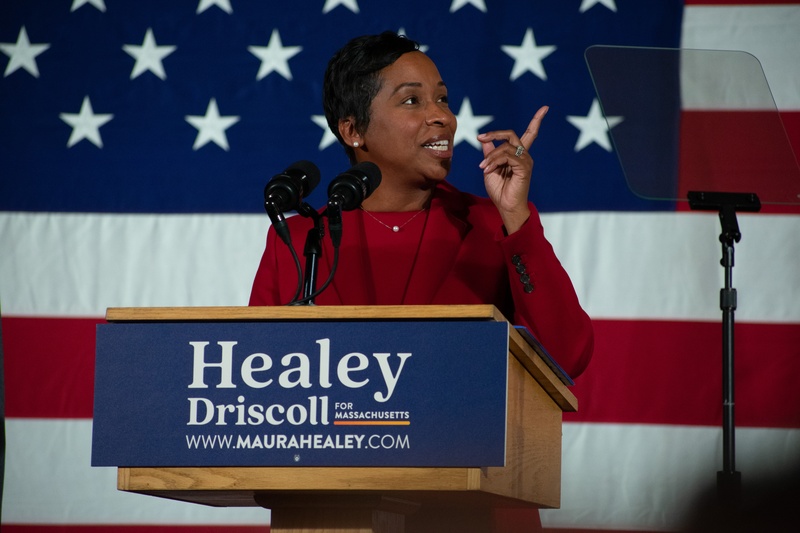
Massachusetts Attorney General Andrea J. Campbell speaks at a watch party held by the Massachusetts Democratic Party during the November 2022 elections.
{image id=1379607 "Massachusetts Attorney General Andrea J. Campbell speaks at a watch party held by the Massachusetts Democratic Party during the November 2022 elections.
Massachusetts joined a group of 20 states filing an amicus brief on Monday in support of Harvard’s lawsuit against the Trump administration’s funding freeze, calling it a “punitive and unlawful” move that “poses an unprecedented threat to the university.”
The 18-page brief, signed by attorneys general representing each of the 20 states and the District of Columbia, argued that massive cuts to Harvard would chip away at a cornerstone of Massachusetts’ economy and set a precedent for similarly destructive actions in other states. If allowed to proceed, the cuts would threaten jobs and businesses, halt career development for scientists, and discourage future innovation, they wrote.
“This wholesale attack will have devastating spillover effects on Massachusetts’s economy — as it would on the economy of any Amicus State if its major research universities were targeted in the same way,” the brief read.
The Trump administration’s funding freeze — which has mounted toward $3 billion — has generated backlash from a growing list of lawmakers and made Harvard into a symbol of rare institutional resistance to the Trump administration. More than 12,000 alumni submitted their own amicus brief Monday, and 24 universities — including five Ivy League schools and MIT — also requested to submit an amicus brief on Sunday.
Massachusetts Attorney General Andrea J. Campbell wrote that “the Trump administration’s attack on Harvard is an attack on the Commonwealth itself” in a statement accompanying the brief.
“The President cannot strong-arm universities into abandoning their core values or relinquishing their independence,” said Campbell. “Harvard is right to uphold diversity, academic freedom, and students’ rights, and I will continue to stand with every university that shows the courage to defend these principles in this moment.”
Campbell has repeatedly sided with Harvard and its affiliates against Trump. In May, she filed an amicus brief in Harvard’s lawsuit against the administration’s revocation of its authorization to host international students and called on the Department of Homeland Security to release a detained Harvard Medical School researcher.
Harvard is the fifth-largest employer of Massachusetts residents and spent over $2.5 billion in salaries, wages, and benefits to Massachusetts residents in fiscal year 2023, according to an annual report produced by Harvard and cited in the brief.
“Much of this massive economic output stems, both directly and indirectly, from research Activity,” the brief read. “Universities inject money into the economy directly through their research.”
The brief also argued that the loss of research dollars would impede the creation of “lifesaving medicines and transformative technologies with potential to improve the health and life of Amici State residents,” citing Harvard’s role in developing new obesity treatments and organ transplantation procedures.
States signing onto the brief also highlights the research conducted in their own top universities, including developing drought-resistant crops, sustainable farming techniques, and renewable energy solutions at the University of Minnesota and the production of a new drug for lung cancer at Princeton University in New Jersey.
“Any attempt to catalog innovations developed through university research would fill innumerable pages,” the brief read, “but the fact that such research improves and lengthens the lives of Amici State residents is indisputable.”
The brief noted that federal funding pays the salaries of many researchers and lab technicians, who may lose their jobs from the freeze, and suggested that foreign countries may recruit researchers to local institutions “where funding streams are more stable.”
Without federal funding, according to the brief, many universities may need to pull funds from other areas — and schools nationwide have already reduced admissions slots to doctoral programs as they face an uncertain funding environment. Harvard’s Graduate School of Arts and Sciences announced in March that all waitlisted candidates across its graduate programs will be rejected.
“In short, the federal government’s current attack on research universities is, in multiple respects, an attack on the states themselves,” the brief read.
—Staff writer Megan L. Blonigen can be reached at megan.blonigen@thecrimson.com. Follow her on X at @MeganBlonigen.













